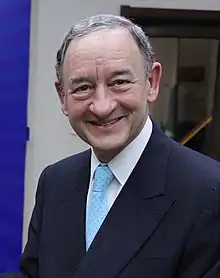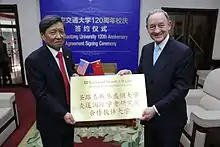Mark S. Wrighton
Mark Stephen Wrighton (born June 11, 1949)[1] is an American academic and chemist who served as the 14th Chancellor of Washington University in St. Louis from 1995 to 2019.
Mark S. Wrighton | |
|---|---|
 Mark S. Wrighton in 2016 | |
| 14th Chancellor of Washington University in St. Louis | |
| In office July 1, 1995 – May 31, 2019 | |
| Preceded by | William Henry Danforth |
| Succeeded by | Andrew D. Martin |
| Personal details | |
| Born | Mark Stephen Wrighton June 11, 1949 Jacksonville, Florida |
| Spouse(s) | Risa Zwerling Wrighton |
| Residence | St. Louis, Missouri |
| Alma mater | Florida State University (BS) California Institute of Technology (PhD) |
| Profession | University administrator and chemistry professor |
Early life and education
Wrighton was born in Jacksonville, Florida, and his father spent most of his career in the United States Navy. Wrighton moved with his family from Jacksonville to Virginia, Tennessee, Maryland, and Newfoundland, and he went to high school in Pensacola, Florida.
Initially, Wrighton intended to study mathematics and government at Florida State University. Instead, inspired by his freshman chemistry professor, Edward Mellon, he switched his major to chemistry. Jack Saltiel[2] became his advisor and mentor, and he continued undergraduate research in the area of organic photochemistry. Wrighton received his bachelor's degree with honors in chemistry at Florida State University in 1969, winning the Monsanto Chemistry Award for outstanding research. He received his PhD in 1972 at the age of 22 from the California Institute of Technology, working under Harry B. Gray and George S. Hammond. His doctoral dissertation subject was Photoprocesses in Metal-Containing Molecules. At Caltech, he became the first recipient of the Herbert Newby McCoy Award.[3]
Massachusetts Institute of Technology
Wrighton joined the faculty of the chemistry department at the Massachusetts Institute of Technology in the summer of 1972 as an assistant professor. In 1976, he was promoted to associate professor and was made a full professor the following year, 1977. Wrighton held the Frederick G. Keyes Chair in Chemistry from 1981 to 1989, when he was given the newly endowed Ciba-Geigy Chair in Chemistry.[3] In 1983, he received a MacArthur Foundation "genius grant."[4]
Wrighton's research interests are centered on photochemistry and transition metal catalysis, and include surface chemistry, molecular electronics and photoprocesses at electrodes.[3] His goals include understanding the basic principles underlying the conversion of solar energy to chemical fuels and electricity, creating new catalysts, studying chemical activity at interfaces, and developing new electro-chemical devices.[5]
Wrighton has carried out work in the areas of inorganic photochemistry, photocatalysis and the use of solar energy in photovoltaics. In the early 1970s he discovered photoluminescence in a new class of rhenium (I) tricarbonyl diimine complexes.[6] In the 1980s, he and his co-workers developed molecule-based transistors having conducting polymers as the device active materials.[7][8] Wrighton was one of the first researchers to introduce the idea of electrochemical gating as a way of controlling charge transport in molecular electronics.[9] One of his later areas of research involved attempting to chemically mimic photosynthesis.[10]
He has written more than 300 journal articles and holds 16 patents.[3] He is co-author of Organometallic Photochemistry (1979, with Gregory L. Geoffroy), and editor of books and conference proceedings. During his time at MIT, Wrighton supervised the doctoral research of 70 students.[5] In 1987, Wrighton became the head of MIT's chemistry department. He became MIT's provost in 1990.[3]
Washington University in St. Louis
In 1995, he left MIT to become chancellor of Washington University in St. Louis. The new position required him to give up an active research career.[10] He was among the highest paid university heads in the United States, making $738,000 in 2007.[11][12] In early 2007, Wrighton was mentioned as a candidate for Harvard University's presidency.[13][14]
As chancellor, he led two major capital campaigns that resulted in contributions totaling nearly $5 billion, including approximately $1 billion for student financial aid, as well as the creation of more than 300 endowed professorships. He was elected chairman of the Association of American Universities (2004-2005)[4] He is also a past chair of the Business-Higher Education Forum (2004-2006) and the Consortium on Financing Higher Education (2000-2001).
Major programmatic initiatives during Wrighton's chancellorship include: the McDonnell International Scholars Academy; the Alvin J. Siteman Cancer Center; the Gephardt Institute for Civic and Community Engagement; the Institute for Public Health; the International Center for Energy, Environment and Sustainability; and the Living Earth Collaborative. New departments include: Sociology; Women, Gender and Sexuality Studies; African and African American Studies; Biomedical Engineering; and Radiation Oncology.
Wrighton was criticized in May 2008 when the university's Board of Trustees voted to honor alumna Phyllis Schlafly with an honorary doctorate, leading to outrage from opponents to her stance on gender issues and from many other members of the university community opposed to her disbelief in evolution. Wrighton distanced himself from the board's decision with a letter to the community disavowing Schlafly's views on science.[15]
On October 6, 2017, Wrighton announced his intent to leave the chancellorship. He concluded his tenure as chancellor on May 31, 2019, and he is now the James and Mary Wertsch Distinguished University Professor and Chancellor Emeritus at Washington University in St. Louis.
National science policy
Wrighton served as a presidential appointee to the National Science Board (2000-2006), which acts as science policy advisor to the President and Congress and the National Science Foundation. He served as vice chair of the National Research Council's Committee on America's Energy Future, which issued its report in 2009.[16]
While at Washington University in St. Louis, Wrighton was one of the signees of a letter from the Association of American Universities, urging all representatives of the U.S. Government to vote in favor of H.R. 810, the Stem Cell Research Enhancement Act of 2005.[17] With leaders at three other Missouri universities, Wrighton wrote in support of somatic cell nuclear transfer (SCNT) research for medical treatment, urging Missouri legislators to distinguish it from the use of stem cells for human reproductive cloning.[18][19]
International academic leadership

Wrighton inaugurated the McDonnell International Scholars Academy as Chancellor at Washington University.[20] He brought Washington University into the University Alliance of the Silk Road, the academic arm of China's One Belt, One Road initiative, as the first North American partner.[20] He serves as the only American member of the Executive Committee of the Universities Alliance of the Silk Road.[20]
Awards and honors
- 1969 Monsanto Chemistry Award (Florida State)
- 1972 Herbert Newby McCoy Award (Caltech)
- 1974 Alfred P. Sloan Research Fellowship
- 1981
- ACS Award in Pure Chemistry of the American Chemical Society
- MIT Chemistry Department Graduate Teaching Award
- 1983
- Honorary Doctor of Science at the University of West Florida
- MacArthur Fellowship
- George and Freda Halpern Award in Photochemistry from the New York Academy of Sciences
- Ernest O. Lawrence Award from the U.S. Department of Energy
- 1984 Fresenius Award of Phi Lambda Upsilon
- 1987 MIT School of Science Teaching Prize
- 1988 Award in Inorganic Chemistry of the American Chemical Society
- 1992 Distinguished Alumni Award (Caltech)
- 1995 Honorary Alumnus (Massachusetts Institute of Technology)
- 2002 Honorary Professorship at Shandong University (Jinan, China)
- 2007 Citizen of the Year Award from the St. Louis Post-Dispatch
- 2007 Honorary Doctorate Degree- Doctor of Humane Letters Florida State University (Tallahassee, Florida)
- 2009 Honorary Doctorate Degree, Harris-Stowe State University (St. Louis, Missouri)
- 2010 Honorary Doctorate Degree, Fudan University (Shanghai, China)
- 2010 Right Arm of St. Louis Award from the St. Louis Regional Chamber
- 2019 Honorary Professor, Xidian University, Xi'an China
Fellowships and appointments
- Member of the Chemistry Research Evaluation Panel of the Air Force Office of Scientific Research (1976–1980)
- Fellow of the American Association for the Advancement of Science (since 1986)
- Fellow of the American Academy of Arts and Sciences (since 1988)
- Member of the Board of Overseers of the Boston Museum of Science (1991–1997)
- Member of the Corporation of the Woods Hole Oceanographic Institution (1991–1995)
- Member of the Corporation of the Charles Stark Draper Laboratory (1994–1996)
- Member of the Board of Directors of Cabot Corporation (since 1997)
- Member of the Board of Directors of the Chemical Heritage Foundation (1998–2002)
- Trustee of the Higher Learning Commission of the North Central Association of Colleges and Schools (1998–2002)
- Trustee of the Donald Danforth Plant Science Center (1998-2019)
- Presidential Appointee to the National Science Board (2000–2006)
- Member of the American Philosophical Society (since 2001)
- Member of the Board of Directors of the National Association of Independent Colleges and Universities (2002–2005)
- Member of the Board of Directors of Brooks Automation (since 2005)
- Member of the Board of Directors of Corning Incorporated[21] (since 2009)
- Fellow of the National Academy of Inventors, 2013[3]
- Member of the Executive Committee of China's University Alliance of the Silk Road, the academic arm of China's One Belt, One Road initiative (2016) [20]
References
- John D. and Catherine T. MacArthur Foundation (1993). The MacArthur Fellows Program: the first decade, 1981-1991. Chicago: John D. and Catherine T. MacArthur Foundation. p. 176. Retrieved 24 April 2015.
- "Formulas for Making Choices". Christian Science Monitor. 1989-12-11. ISSN 0882-7729. Retrieved 2019-09-03.
- "National Academy of Inventors elects Chancellor Wrighton as Fellow". Washington University in St. Louis. December 12, 2013. Retrieved 24 April 2015.
- "FSU alumnus Mark Wrighton, leader in higher education, is awarded honorary doctorate". FSU News. Retrieved 24 April 2015.
- "Mark S. Wrighton Chancellor, Washington University in St. Louis". Washington University in St. Louis. July 20, 2006.
- De Cola, Luisa; Chiorboli, C. (2005). Molecular wires : from design to properties. Berlin: Springer. p. 4. ISBN 9783540257936. Retrieved 24 April 2015.
- Sasabe, Hiroyuki (2000). Hyper-structured molecules II : chemistry, physics and applications (2nd International Forum on Hyper-Structured Molecules Sapporo, Japan, 30 May - 1 June 1997). Amsterdam: Gordon & Breach. p. 25. ISBN 978-9056992156.
- Jones, E. Tracy Turner; Chyan, Oliver M.; Wrighton, Mark S. (September 1987). "Preparation and characterization of molecule-based transistors with a 50-nanometer source-drain separation with use of shadow deposition techniques. Toward faster, more sensitive molecule-based devices". Journal of the American Chemical Society. 109 (18): 5526–5528. doi:10.1021/ja00252a039.
- Metzger, Robert M. (Jan 10, 2012). Unimolecular and Supramolecular Electronics II: Chemistry and Physics Meet at Metal-Molecule Interfaces. Springer Science & Business Media. ISBN 9783642273971. Retrieved 24 April 2015.
- Hoke, Franklin (July 10, 1995). "MIT Provost Mark Wrighton Moves To Washington University As Longtime Chancellor William H. Danforth Steps Down". The Scientist. Retrieved 24 April 2015.
- Kelsey Volkmann (November 19, 2008). "Wash. U.'s Wrighton takes pay cut, endowment drops 25%". St. Louis Business Journal. Retrieved 2010-01-12.
- Lewis, Elizabeth (October 26, 2005). "Chancellor's salary higher than Harvard, Duke". Student Life. Retrieved 2007-10-28. External link in
|work=(help) - "Panel Considers 30 for Top Job | News | The Harvard Crimson". thecrimson.com. Retrieved 2014-12-11.
- "Wrighton likely contender for Harvard president position". studlife.com. Retrieved 2014-12-11.
- "Students, Faculty quietly protest Schlafly at Commencement". studlife.com. Retrieved 2014-12-11.
- Academies, Committee on America's Energy Future, National Academy of Sciences, National Academy of Engineering, National Research Council of the National (2009). America's energy future : technology and transformation (Summary ed.). Washington, D.C.: National Academies Press. p. 642. ISBN 978-0309141451. Retrieved 24 April 2015.
- "Letter to all Members of the U.S. House of Representatives". Association of American Universities. May 23, 2005. Archived from the original on 26 March 2015. Retrieved 24 April 2015.
- Watts, Judy H. (2005). "Stem Cells Hold Great Promise". Washington University in St. Louis Magazine. Retrieved 24 April 2015.
- McCook, Alison (January 3, 2005). "Missouri stem cell ban possible Both sides of somatic cell nuclear transfer debate are pleading their case to legislators". The Scientist. Retrieved 24 April 2015.
- "美国圣路易斯华盛顿大学主页报道推进与西安交大实质性合作". 15 April 2016. Retrieved 30 September 2016.
- "Mark S. Wrighton". Corning Incorporated Board of Directors. Retrieved 24 April 2015.
